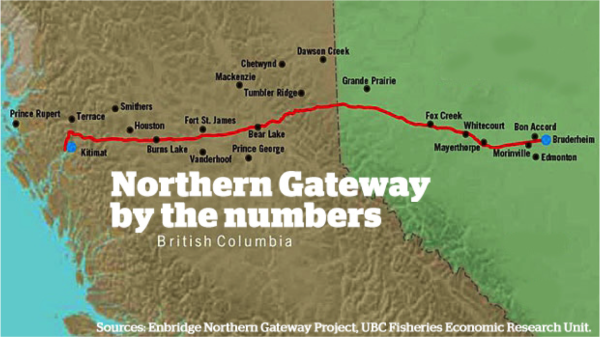Expanding Canada’s oil market has the potential to produce great economic benefits for Canadians, as Alberta’s oil reserves can be used to meet the world’s future oil supply needs. A series of controversial issues, however, have emerged in opposition to such projects. Just last week, the residents of Kitimat, B.C. voted against the proposed Northern Gateway pipeline project in a non-binding plebiscite. As such, it is important to evaluate the various environmental, indigenous and economic concerns over Canada’s potential expansion into the global market with the Enbridge Northern Gateway Pipeline.
The Pipeline
Enbridge has proposed a $6.5 billion dollar energy infrastructure project that consists of two parallel pipelines, and a marine terminal to transport oil and condensate (a liquid petroleum by-product). The pipeline will be approximately 1,170 kilometers in length, transporting oil and condensate between Bruderheim, Alberta, and Kitimat, and British Columbia.
The purpose of the project is to increase the competition and transportation options for oil producers by providing access to markets in Asia. Enbridge asserts that this will lead to “higher economic benefits for Canadian producers and encourage innovation in Canada’s energy sector.” Currently, Canada is dependent on the U.S for its oil exports, with the States receiving 99% of Canada’s oil exports.
The Joint Review Panel, an independent body was mandated by the Minister of Environment and the National Energy Board, to determine whether or not the project posed significant environmental impacts. Recently, the Joint Review Panel recommended the project with 209 conditions. The federal cabinet is expected to release its decision on the pipeline project by June this year.
Environmental Concerns
One of the key issues over the construction and the operation of the Northern Gateway Pipeline is the potential environmental risks. Many environmental groups, government agencies and other organizations have expressed concern over pipeline failures and spills. A report released by the Alberta Energy Regulator indicates in section 4.2 that a total of 880 pipeline ruptures have occurred from 1990 to 2012. It is important to note, however, that the frequency of accidents has decreased, mostly due to more stringent regulations for pipeline design and construction; yet, many still believe that the environmental threats are too great to prioritize the economy over the environment. BC Environment Minister, Terry Lake, said “British Columbia thoroughly reviewed all of the evidence and submissions made to the panel and asked substantive questions about the project including its route, spill response capacity and financial structure to handle any incidents.”
Indigenous Concerns
Indigenous concerns have stemmed from the location and environmental impacts of the pipeline. Many indigenous communities are concerned with the potential ecological impacts and the adverse effects it can have for Aboriginal land use and culture. If the pipeline contaminates the marine, terrestrial, and watershed systems, many groups’ traditional lifestyle could be impacted. Although many First Nation groups have supported the project and hope to take advantage of the economic and social benefits that the project proposes, such as job creation, equity ownership, and stewardship programs, many groups still oppose the pipeline. Peter Erickson, a hereditary chief of the Nak’azdli First Nation, stated “there was some economic interests expressed by the company – we looked at all of that, and just believed it cannot be done in a manner that would be sustainable long-term for our community.”
The Economic Debate
Overall, the pipeline is seen as offering both economic benefits and disadvantages. It is viewed as an opportunity for Canada to “intensify its position as a global energy producer.” Diversifying Canada’s oil market can increase the netback price for Canadian production, which would benefit the Canadian oil industry, and benefit Canadians as a whole by increasing Canada’s GDP by over $300 billion over the next 30 years. Additionally, the project is expected to provide local communities with economic benefits, such as employment growth.
The issue, however, is that the benefits are short-term and that other industries may be negatively impacted. Enbridge has estimated that the pipeline project will produce 62,700 person-years of short-term construction employment and 1,1150 long term jobs. Conversely, a report produced by the Canadian Centre for Policy Alternatives states that these estimates are inflated due to Enbridge’s input-output modeling, and will likely paint a different picture when or if the project is approved. Furthermore, the project may negatively impact other industries. For example, a report by the World Wildlife Fund states that if a coastal spill were to occur it would adversely impact the marine dependent market place.
In the end, the federal government will have to decide whether the economic benefits of diversifying the Canadian market will outweigh the environmental and indigenous concerns. Taking into account the recent non-binding plebiscite by Kitimat residents, it might be politically contentious for the Government of Canada to approve a project that has not won the support of the local communities, especially considering the vast public outcry from citizens, environmentalists, government agencies and many other individuals and organizations.





